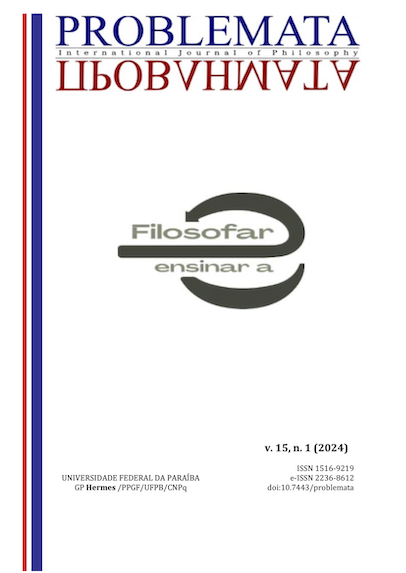THE MOCKING PHILOSOPHY AND ITS AFFIRMATIVE POWER IN GAIA SCIENCE
DOI:
https://doi.org/10.7443/problemata.v15i1.69284Keywords:
Nietzsche, Happiness, Laughter, Creation, PhilosophicalAbstract
This article will endeavor to demonstrate, following the thought of Friedrich Nietzsche (1844-1900) and his work The Gay Science (1882), The joy is a theme of paramount importance in the nietzschean thought, since it appears constantly throughout his theoretical production and is consistent with other key elements of his thought, such as the tragic and the will to power. The joy and the laugh emerge as counterpoint to the rigid and dogmatic structures of thought, such as metaphysics and Christianity, that sustained the most part western thought. Nietzsche develops a philosophy that congregate the joy and the laugh as way of affirmative thought, that is able to accept the vicissitudes of life and still to create other ways of being and acting in the world. The philosopher evokes the power of laugh as inciter an autonomous philosophical thought without excluding the tragicity that makes up existence. Thus, after addressing the question of joy, we will think how is its incidence in a body that is life, creation and laugh.
Downloads
References
BARRENECHEA, Miguel. Nietzsche e o corpo. Rio de Janeiro: 7Letras, 2017.
CORDEIRO, Robson. O corpo como grande razão: análise do fenômeno do corpo no pensamento de Friedrich Nietzsche. São Paulo: Annablume, 2012.
DELEUZE, Gilles; PARNET, Claire. Diálogos. São Paulo: Escuta, 1998.
DIAS, R.M. O riso na filosofia da criação de Nietzsche. Revista Enunciação. v. 4, n. 1, p. 13-23, 2019.
MARTON, Scarlett. A morte de Deus e a transvaloração dos valores. HIPNOE. n. 4, p. 133-143, 1999.
NIETZSCHE, Friedrich. A Gaia Ciência. São Paulo: Companhia das Letras, 2012.
NIETZSCHE, Friedrich. Humano demasiado humano: Um livro para espíritos livres, vol. II. São Paulo: Companhia das Letras, 2017.
NIETZSCHE, Friedrich. Ecce homo: Como alguém se torna o que é. São Paulo: Companhia das Letras, 2008.
NIETZSCHE, Friedrich. Crepúsculo dos Ídolos ou Como se filosofa com o martelo. São Paulo: Companhia das Letras, 2017.
NIETZSCHE, Friedrich. Genealogia da moral: uma polêmica. São Paulo: Companhia das Letras, 2009.
NIETZSCHE, Friedrich. Aurora: reflexões sobre os preconceitos morais. São Paulo: Companhia das Letras, 2016.
NIETZSCHE, Friedrich. Assim falou Zaratustra. São Paulo: Companhia das Letras, 2018.
NIETZSCHE, Friedrich. O nascimento da tragédia. São Paulo: Companhia das Letras, 2020.
OLIVEIRA, Jelson. Nietzsche e o Heráclito que ri: solidão, alegria trágica e devir inocente. Veritas, v. 55, n. 3, p. 217-235, dez. 2010.
OLIVEIRA, Jelson. “Nós” de Nietzsche: Um pronome plural para a amizade e uma nova expressão para a filosofia. Cadernos de Ética e Filosofia Política. v. 1, n. 20, p. 103-119, 2013.
SAAVEDRA, Roberta Franco. Amor fati e eterno retorno no livro IV de “A gaia ciência”: uma interpretação estética da existência. Griot: Revista de Filosofia, v. 18, n. 2, p. 43-60, dez. 2018.
SOUZA, Paulo César. Posfácio. In: NIETZSCHE, Friedrich. A gaia ciência. São Paulo: Companhia das Letras, 2012.
Downloads
Published
Issue
Section
License
Copyright (c) 2024 Francisco de Assis Silva Neto Neto

This work is licensed under a Creative Commons Attribution 4.0 International License.
Authors who publish with this journal agree to the following terms:
- Authors retain copyright and grant the journal right of first publication with the work simultaneously licensed under a Creative Commons Attribution License that allows others to share the work with an acknowledgement of the work's authorship and initial publication in this journal.
- Authors are able to enter into separate, additional contractual arrangements for the non-exclusive distribution of the journal's published version of the work (e.g., post it to an institutional repository or publish it in a book), with an acknowledgement of its initial publication in this journal.
-
- Authors are permitted and encouraged to post their work online (e.g., in institutional repositories or on their website) prior to and during the submission process, as it can lead to productive exchanges, as well as earlier and greater citation of published work (See The Effect of Open Access).





